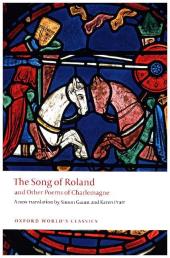 Neuerscheinungen 2016Stand: 2020-02-01 |
Schnellsuche
ISBN/Stichwort/Autor
|
Herderstraße 10
10625 Berlin
Tel.: 030 315 714 16
Fax 030 315 714 14
info@buchspektrum.de |

Simon Gaunt, Karen Pratt
(Beteiligte)
The Song of Roland and Other Poems of Charlemagne
Herausgegeben von Gaunt, Simon; Pratt, Karen
2016. 288 S. 196 mm
Verlag/Jahr: OXFORD UNIVERSITY PRESS 2016
ISBN: 0-19-965554-5 (0199655545)
Neue ISBN: 978-0-19-965554-0 (9780199655540)
Preis und Lieferzeit: Bitte klicken
The Song of Roland offers fascinating insights into medieval ideas about heroism, manhood, religion, race, & nationhood which were foundational for modern European culture. It is the oldest known surviving major work of French literature based on the Battle of Roncevaux in 778, during the reign of Charlemagne.
Charles the king, our emperor great,
Has been a full seven years in Spain.
As far as the sea he conquered this haughty land.
Not a single castle remains standing in his path
Charlemagne (768-814) was crowned Holy Roman Emperor in 800 and presided over a huge empire. He frequently appears in literature as a great warlord and pious crusading figure. In 778, the rearguard of Charlemagne´s retreating army was ambushed and defeated at the battle of Roncevaux. This became the inspiration for songs and poems celebrating deeds of valour in the face of overwhelming odds, through the character of Charlemagne´s nephew (the imaginary) Roland. The Song of Roland is the
most stirring and moving epic poem of the European Middle Ages, offering a particularly heady mixture of history, legend, and poetry.
Presented here in a lively and idiomatic new translation, the Song of Roland offers fascinating insights into medieval ideas about heroism, manhood, religion, race, and nationhood which were foundational for modern European culture. The Song of Roland is accompanied here by two other medieval French epics about Charlemagne, both of which show him to be a far more equivocal figure than that portrayed by the Roland: the Occitan Daurel and Beton, in which he is a corrupt and
avaricious monarch; and the Journey of Charlemagne to Jerusalem and Constantinople, which gives the heroes of the Roland a comic makeover.
Simon Gaunt taught in Cambridge for 10 years before taking up his current position at King´s College London in 1998. He has been Head of Department and Dean of Faculty at King´s, also President of the Society for French Studies. He was Principal Investigator on an AHRC-funded research project (http://www.medievalfrancophone.ac.uk/) and is currently PI on an ERC-funded research project (https://blogs.kcl.ac.uk/tvof/).
Karen Pratt taught at Goldsmiths´ College, University of London, until moving to King´s College London in 1993. She has been President of the British branch of the International Courtly Literature Society, of the British Branch of the International Arthurian Society, and of the London Medieval Society. She was one of the investigators on a HERA-funded collaborative research project: http://dynamicsofthemedievalmanuscript.eu/.


